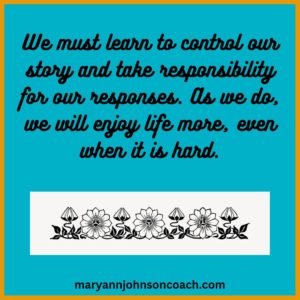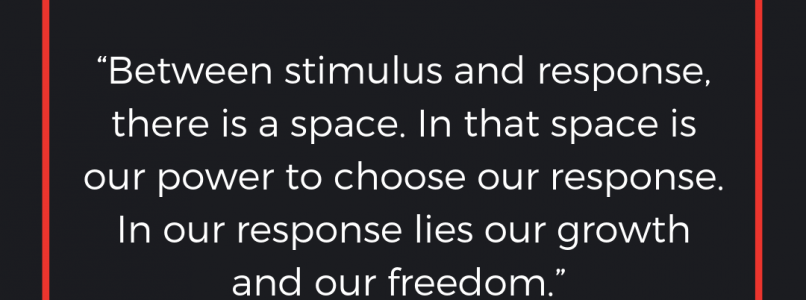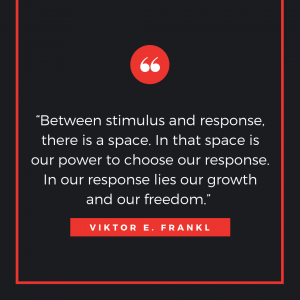 Today, although there are things I could share that would be less time-consuming to write and less emotionally draining, I am telling you about my morning. I am sharing this experience for a reason. After several decades of working on two principles, they can still trip me up. They are also stumbling blocks for many moms I talk with. I have written about them often, and I don’t want to beat a dead horse, but this is pivotal for our happiness and our ability to parent and relationship well.
Today, although there are things I could share that would be less time-consuming to write and less emotionally draining, I am telling you about my morning. I am sharing this experience for a reason. After several decades of working on two principles, they can still trip me up. They are also stumbling blocks for many moms I talk with. I have written about them often, and I don’t want to beat a dead horse, but this is pivotal for our happiness and our ability to parent and relationship well.
What is so challenging to manage?
1. You are 100% responsible for your response, regardless of circumstances or other people.
2. Control your story. You are not a victim!
Yeah, they make me feel annoyed, too. : ) A few decades have passed since I learned about number 1. After learning this principle, I was angry for ten years because how could I be totally in control of my response when my husband and kids kept doing and saying stupid stuff? And then there were the neighbors, the government, and a chaotic world.
I didn’t know anything about number two for at least fifteen years after learning the first principle. I had lived as a victim most of my life, from childhood, when I was a victim, right into my late fifties. It was frankly, if not a happy place to be, comfortable. Figuring out how to change my thinking in both areas was going to be a lot of work, and I wasn’t looking forward to it.
This morning is a perfect example of the two principles above, the work required to live them, and the result of both living and ignoring them. I hope you won’t be bored. I also hope it may ring a bell or turn on a light. : )
It has been a whirlwind at my home since the beginning of December. I got all my Christmas baked, wrapped, mailed, and delivered, including the friend and neighbor gifts. Then I helped two very old and ill friends get theirs done. I have a 53-year-old special needs friend who needed me to help her with a couple of things. I was glad to assist her, but it took time and effort. On Wednesday, Don and I traveled from one end of the Salt Lake Valley to the other and from one side to the other to connect with dear friends we only see every few years. It was a delightful but completely exhausting day.
During these early weeks, we all had the flu, and you know what that entails for the women in charge, sick or not. : ) Jodie’s kids were all ill, as was she, but she still had to work, so I was on deck for a portion of each day. I had to care for Mom and Don. We have all recovered, for the most part, but it has been a long two weeks. By this Friday, I was done in and ready for a break.
Friday night I dropped into my chair at about 8 pm to look over the Saturday schedule, only to discover that we had a church Christmas Breakfast at 9 am, and I had promised to take a family of older people who would normally not attend. We care very much about this family, but seeing this on the calendar, I came unglued. I felt so angry. I yelled that it was too much.
What frustrated me was that in my mind, I thought I was done and that today, Saturday, was going to be free, except for writing my article, which I hadn’t even started on. This is something I try to avoid by writing a little each day but here I was, not only going to need to write an article, create a newsletter, and record a podcast, but now I was going to have to get my own family up and out of the house by 9 am, pick up another family, do a lot of smiling and talking and then come home and do this big job I had left to the last minute!!
Well, I sat there fuming that my life was too hard, I had too much to do, nobody else did their share, and on and on. However, it was bedtime, so I had to shut it down and move on. Fortunately for me, I have a system to ‘dump’ the stuff out of my brain and I know how to meditate myself to sleep, so fifteen minutes after lying down, I was asleep.
When I woke up this morning, I was still ticked off. Why me? Why another big day? It wasn’t fair. I didn’t want to feel this way, but I did, and I didn’t have the energy or time to work it out. I got my family into the car, picked up our friends, and drove to the church.
It was going to be OK though, because I could at least sit and eat, right? I could rest since I wasn’t in charge of anything and wasn’t doing any cooking or serving. It didn’t turn out that way. The event was very well attended and the line to serve yourself breakfast was long! I got my plate and my mother’s and helped my older friends. After about twenty minutes, we all sat down, and I ate a grape. All I had was fruit and yogurt because the main dish was filled with pork, a food I cannot eat. Another thing to be bummed about. However, I like grapes. As I picked up my second grape, Jodie asked me if I could sit by Maggie so she could get a plate.
If you think the line was long when I went through, it was double that for Jodie. Over thirty minutes later, she finally returned. By that time, I had fed Maggie my yogurt, rolled her over to watch the movie Polar Express, and tracked down Santa so she could get a photo with him. Jodie finally came back with a plate. However, neither of us got to eat!
It was time for the children’s nativity play, and Maggie was the Heavenly Star, so Jodie put her costume on and got her on stage. I had gotten some more yogurt, but the family I brought were ready to go home, as was Don and my mom. So, I drove them home.
Here is the important part of this morning’s story.
There I was bringing an older, ill couple to the party and Don and my mom. Saint, right? Then I stood and fed Maggie my yogurt. Feeding a child who eats mostly from a tube in her stomach isn’t the easiest thing to do. Saint, right? And I didn’t get to eat, but made sure those older people I brought got home when they were done in. Super saint, for sure.
Well, as I was helping everyone up and out to the car, my friend, Bunnie, leaned over and said, “You are such a wonderful person. So gentle and kind,” or words to that effect. I looked at her and replied, “Don’t give me too much credit. I am feeling angry and annoyed.” Another friend at the table, who also helps care for these elderly friends, looked at me quizzically and said, “Angry?” I replied, “Well that isn’t the right word, more like irritated and annoyed.” Then I smiled lamely and shepherded everyone out to the car.
I responded the way I did because the whole morning, I was continuing the very negative conversation from the night before, in my head. You know, the one I mentioned before – Why me? Why another big day? It isn’t fair. I should be able to eat. Why do I have to get up early and go to bed on time? Why can’t I be a lazy bum? Why can’t someone else be kind and do this stuff? I have too much to do, nobody else does their share, and on and on. Bunnie’s comment, which was meant as a sincere compliment, was a punch in the gut.
Doing The Work
Now, to be honest, the whole mental conversation wasn’t negative. I was making an effort to get a grip on my story. At one point, while feeding Maggie, I went over the things I had managed in the last two weeks and I asked myself questions, “Did anyone make you do this? Could you have not done it? Why did you? Were you afraid to say no? Was your self-esteem on the line? I answered each question honestly, as I have practiced for decades. Ultimately, I knew I chose each of these things because I wanted to. It’s my way of being and I like how I am. There was no one or any circumstance to blame. I had consciously made choices that fit with what I wanted my December to look like. Ok, I was making progress with number 1.
Nevertheless, it was a back-and-forth, emotionally challenging mental conversation. I knew when I got home, I would need to do some more work to manage number 2, controlling my story. I could go for a walk and yell until I was done yelling. I could smile, even if I didn’t feel like it, because it still releases endorphins. I could go home and do a dump write and then crumple it up and throw it away. What I choose to do is the tool that works best for me. I prayed. I dumped on God because I knew He wasn’t mad at me when I acted lame. : ) Then I began asking God to help me sort out why I felt distressed. I had helpful thoughts. I had been ill. I was overly tired. I did need a rest, but I still had work left to do, write to you. : ) I got my story straight.
As I finished my prayer, I knew I still had emotions to manage and I spent the next couple of hours, as I cooked a wonderful lunch for my family and began working on this article, doing just that.
How do I feel now, at 4:45 pm? I still have lots to do to finish this article, the newsletter, and the podcast. But I feel OK. There isn’t anything I have done in the last two weeks that I wouldn’t do over again, by choice. I know that I have done my best to care for myself. I went to bed on time more days than not. I got up early and did as much of my morning routine as was feasible. I dumped the junk before bed and slept well. I took a day off when I was ill.
I’m not angry, irritated, or annoyed anymore. I know who I am. I know why I was emotionally challenged. My story is straight. I’m not blaming anyone or anything. Tomorrow is Sunday, a Sabbath for me. I will rest, and then I will prepare for next week.
You can see the work I had to do over an evening and much of a day, to get my head straight about my story and my responsibility. It took work, but I got the work done.
Here is the result.
Last night and this morning I felt angry and annoyed. I couldn’t enjoy my friends or being with people. Now, I am at peace. I feel happy with myself and the kindnesses I have been able to share. I feel somehow rested, even though I am facing a few hours of editing and recording. I am at peace with myself, my family, my friends, and the world.
When we choose to accept responsibility for our responses, when we let go of blaming anyone or any circumstance; when we ask honest questions and get our story straight, we will find ourselves happier and more at peace. This allows us to parent from a better place and to manage our relationships with better outcomes.
Each of you has had a couple of days, weeks, or even months like mine. Each of us must learn how to control the story and how to take responsibility for our responses.
As we do, we will enjoy life more, even when it is hard.
A Response to This Article and a Tender Mercy





 I received a call from my sister, Rozanne. She was giving me an update on a difficult situation in her life. It was such a profound example of taking responsibility for your responses and choosing to let go of suffering, I asked her if I could share the experience with you.
I received a call from my sister, Rozanne. She was giving me an update on a difficult situation in her life. It was such a profound example of taking responsibility for your responses and choosing to let go of suffering, I asked her if I could share the experience with you.
 The trip was a mixed bag, if I am honest. The kids and I had some great times, and I kept Gus worn out. : ) He had one nap and wanted another Saturday, but we were busy. This from a boy who has all but given up naps.
The trip was a mixed bag, if I am honest. The kids and I had some great times, and I kept Gus worn out. : ) He had one nap and wanted another Saturday, but we were busy. This from a boy who has all but given up naps.
 I had few boundaries! There were good reasons that I found myself in this place as a mother; sexual abuse, controlling adults, fear brought on by the cold war, and the upheaval of civil unrest, a belief that I shouldn’t have been born. Life and the future felt uncertain. I had no way to make sense of what was happening in my world and the larger world, no one to talk to about it, and it added to the fear I had held inside since I was a toddler.
I had few boundaries! There were good reasons that I found myself in this place as a mother; sexual abuse, controlling adults, fear brought on by the cold war, and the upheaval of civil unrest, a belief that I shouldn’t have been born. Life and the future felt uncertain. I had no way to make sense of what was happening in my world and the larger world, no one to talk to about it, and it added to the fear I had held inside since I was a toddler. A year ago, I met a relative I didn’t know existed. She is a painter, and I told her about my dream. She painted it for me, and it hangs on my office wall. Every day I repeat the above words out loud, and I look at my painting.
A year ago, I met a relative I didn’t know existed. She is a painter, and I told her about my dream. She painted it for me, and it hangs on my office wall. Every day I repeat the above words out loud, and I look at my painting. So let go of your worry. Do the best you can. Trust yourself and God that you can be whole. Trust your children that they will also do the work we all have to do. Then keep changing and growing. Healing and growing are each of
So let go of your worry. Do the best you can. Trust yourself and God that you can be whole. Trust your children that they will also do the work we all have to do. Then keep changing and growing. Healing and growing are each of  I recently finished reading The Choice. The author, Dr. Edith Eva Eger, spent part of her teen years in Auschwitz. She shares things she learned while there, after she left, and while working as a psychiatrist with other trauma victims. It was gut-wrenching and not a pretty read. I had to endure a bit of foul language. It went with the territory.
I recently finished reading The Choice. The author, Dr. Edith Eva Eger, spent part of her teen years in Auschwitz. She shares things she learned while there, after she left, and while working as a psychiatrist with other trauma victims. It was gut-wrenching and not a pretty read. I had to endure a bit of foul language. It went with the territory. Mary, was six, she loved to watch the fish in our tank. We have a very sleek, silver catfish that swims fast and erratically whenever anyone stands in front of the tank. I believe the fish does this out of fear or because it has been disturbed.
Mary, was six, she loved to watch the fish in our tank. We have a very sleek, silver catfish that swims fast and erratically whenever anyone stands in front of the tank. I believe the fish does this out of fear or because it has been disturbed.
 One of my sisters decided to finish her basement and hired another sister and her husband to do the job. It’s important to know that they aren’t contractors but thought they could do the job. My sister, Nanette, went to Google to learn how it was done. She estimated that it would take them about two weeks.
One of my sisters decided to finish her basement and hired another sister and her husband to do the job. It’s important to know that they aren’t contractors but thought they could do the job. My sister, Nanette, went to Google to learn how it was done. She estimated that it would take them about two weeks. whether my sister should have said yes. It’s more a question of what my sister wanted.
whether my sister should have said yes. It’s more a question of what my sister wanted.
 Recently I was taken back in time as I listened to a soundtrack by John Denver. He was a singer-songwriter from the1960s through the 1990s. I was a young teen when he began his career and I enjoyed his music.
Recently I was taken back in time as I listened to a soundtrack by John Denver. He was a singer-songwriter from the1960s through the 1990s. I was a young teen when he began his career and I enjoyed his music.
 I bet you clicked this email because the subject line ticked you off! Twenty years ago, it would have ticked me off too. However, I hope to move you in the direction of accepting this as true because it has great bearing on what
I bet you clicked this email because the subject line ticked you off! Twenty years ago, it would have ticked me off too. However, I hope to move you in the direction of accepting this as true because it has great bearing on what